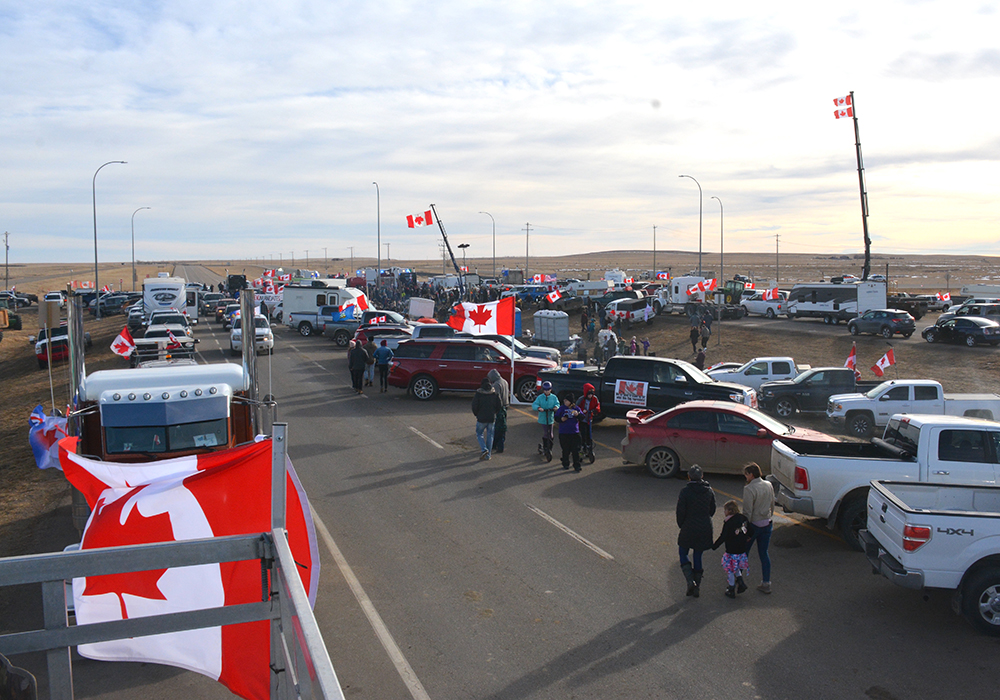Alberta’s premier says lifting vaccine passports in Alberta was not intended to pry open the border from protesters at Coutts.
“That blockade, all it does is inconvenience thousands of law-abiding truckers who are just trying to make a living who now have to go to one of the three other ports of entry between Alberta and Montana,” Jason Kenney said last night during a COVID-19 update, indicating the Coutts protest site was made up of 38 semi-trucks, which represents a small percentage of the industry.
“So, we would ask those folks to stop the blockade. We expect the RCMP to enforce the law. They are responsible for the operational tactics and how that is done.”
Read Also

Stacking Canada up on gene editing livestock
Canada may want to gauge how Argentina and other countries have approached gene editing in livestock and what that has meant for local innovation.
While the number of semi-trucks cited by the premier is consistent with what The Western Producer has seen, it does not include the estimated 200 protesters, including children, who have set up a headquarters at the Smuggler’s Saloon in the village of Coutts. Nor did Kenney acknowledge the numerous passenger cars and trucks, tractors and RVs at the Coutts site.
Nor was there mention of the estimated several thousands of area residents, farmers and ranchers who have shown their support to the Coutts blockaders by travelling to the scene and establishing a secondary protest site near Milk River and added to traffic congestion.
Alberta has four other border crossings with Montana — Wild Horse, Aden, Del Bonita and Carway — with none of them able to be used for shipments of live cattle south of the border, nor are they accessible 24 hours a day.
Requests by The Western Producer for comment regarding the situation and impacts to the agricultural sector from both Kenney and agriculture minister Nate Horner have yet to be responded to as of this morning.
Kenney did briefly mention the impacts to the provincial agricultural sector from the Coutts blockade during his media availability Tuesday.
“These and other road blockages constitute a safety hazard, a serious interference in the lives of others, does economic damage — in this case, particularly for ranchers and farmers and agri-food producers,” Kenney said.
Horner, who had yet to hold a media availability this morning about the impacts to the agricultural sector, posted on his Facebook account Feb. 3 that it is harming the industry.
“I hope everyone involved can see that the end of COVID restrictions is imminent, and this blockade is hurting our agricultural sector,” he posted six days ago.
Alberta NDP leader Rachel Notley used a wide brush in painting those who have blocked or slowed traffic to the border as “criminals.”
“When you are blockading, when you are on the highway and you are parked and you are not letting people get around the highway, then you are in effect breaking the law,” said Notley during a Monday press availability.
“This has not been going on for one hour or two hours or three or even a day.”
Notley said 10 days into the blockade, the traffic disruption is costing the Alberta economy an estimated $500 million, and she has heard from those in southern Alberta who are feeling a financial hit caused by the protest.
On Tuesday, RCMP and the province’s acting justice minister also shared the opinion that the blockade constitutes an illegal activity.
“Make no mistake, there are illegal activities taking place at these protest sites that violate both criminal code and provincial laws,” said RCMP deputy commissioner Curtis Zablocki.
“We’ve seen activities that are dangerous and reckless and that are having a very profound negative effect on Albertans that live in the area.”
Zablocki said Mounties from British Columbia have been drafted into Alberta to assist with the domestic unrest in southern Alberta, but tow companies contacted by the RCMP are refusing to help move the heavy vehicles blocking the border.
“We are investigating, there will be charges and this will not end when the road is clear,” he said.
Farm tractors and vehicles have breached the clearly marked police roadblock at least twice since Feb. 1 — on that day as well as on Monday evening — resulting in lengthy complete closures of the border highway.
However, it has also been the scene of children playing, families gathered by campfires and a general feeling that the protest is a manifestation of frustration with pandemic restrictions and the inability of government to address those issues.
















